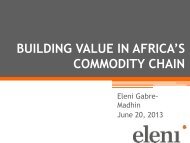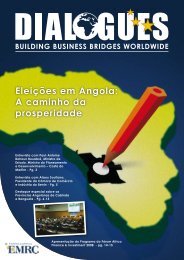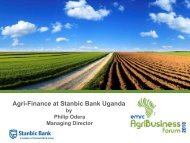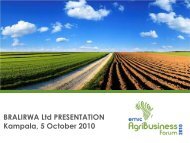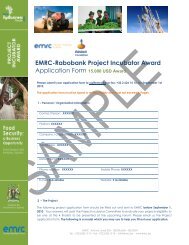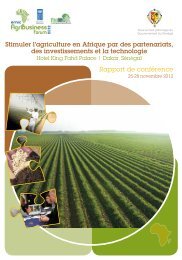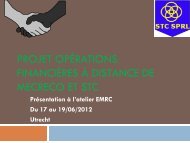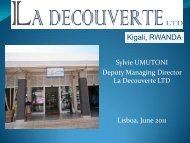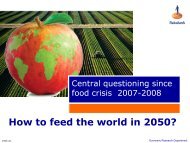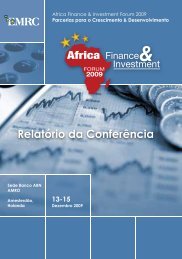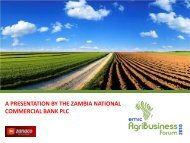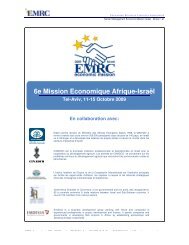English - EMRC
English - EMRC
English - EMRC
Create successful ePaper yourself
Turn your PDF publications into a flip-book with our unique Google optimized e-Paper software.
“Health is Wealth”<br />
The Global Fund to fight AIDS, Tuberculosis<br />
and Malaria is headquartered in<br />
Geneva, Switzerland. It was set up in 2002<br />
at the initiative of the then Secretary General<br />
of the United Nations, Kofi Annan, to<br />
mobilise, manage and disburse large sums<br />
of money, initially to combat the spread of<br />
HIV/AIDS in developing countries. Mr Annan<br />
put his money where his mouth was by<br />
time situations can be included in models that<br />
will be used to create partnerships and share<br />
experiences.<br />
■ Dialogues: Considering that a company’s<br />
experience can stimulate other companies<br />
to follow its footsteps, could you give us an<br />
example that proves that the system works,<br />
where partnerships are actually taking<br />
place?<br />
ML : The Malawi project, is a very important<br />
project that was introduced four to five<br />
years ago, that I helped negotiate, where<br />
the Ministry of Health received one of the<br />
first rounds of grants from the Global Fund<br />
($ 200 Million) on HIV treatment. The proposal<br />
was considered a very sound one but,<br />
not unexpectedly, within a year the government<br />
started to have some problems executing<br />
and implementing. The process at the Global<br />
Fund is results-based and if a recipient can’t<br />
deliver, then, either solutions are found, either<br />
the grant is lost. For the Malawi situation, we<br />
argued that there was a structured coalition of<br />
businesses involved in HIV. It included more<br />
than thirty companies, working together on<br />
the disease with clinics and trained personnel.<br />
After two years, the coalition negotiated the<br />
terms of delivery of a large part of the grant,<br />
which enabled the government to actually<br />
keep the grant. This shows that you can create<br />
large scale partnerships using the capacity,<br />
additional financial and technical resources.<br />
This example has become a very interesting<br />
and useful model for future projects.<br />
There are also very interesting initiatives regarding<br />
Malaria, like MOZAL, in South-Africa<br />
and Mozambique, developed for three<br />
years now. Joint programmes between local<br />
governments, the Global Fund and NGOs<br />
have been implemented to distribute medicine<br />
and treatments for malaria, which has brought<br />
very significant and rapid results, on the workforce,<br />
as well as on their families and the local<br />
communities. Also, the eco-system has benefited<br />
from these joint programmes and as a<br />
result, tourism has grown. ■<br />
making a personal donation of USD100,000<br />
to what he called the “war chest”.<br />
Today, five years later, the Fund’s assets total<br />
USD 21 billion, of which 10 billion have<br />
been committed to health programmes already<br />
approved by the fund in 136 countries on 5<br />
continents. Moreover: today the Fund’s programmes<br />
target not only HIV/ AIDS, but also<br />
the two other major poverty-related pandemics:<br />
malaria and tuberculosis. At the present<br />
time, the Fund’s money accounts for 65% of<br />
available international resources in the fight<br />
against tuberculosis, 65% for malaria and 25%<br />
for HIV/AIDS. Within the Fund’s investment<br />
portfolio in developing countries, spending is<br />
almost evenly spread with 60% allocated to<br />
HIV/AIDS and 40% to malaria and tuberculosis<br />
combined. Contributors to the Fund include<br />
governments, institutions, foundations<br />
and private individuals. A donation from the<br />
Bill and Melinda Gates Foundation totalled<br />
USD650 million.<br />
‘The three pandemics are<br />
closely related and often occur<br />
together, with the same<br />
devastating consequences,<br />
in particular for developing<br />
countries in Africa, Asia,<br />
Latin America and the Caribbean<br />
and also Eastern Europe.<br />
Of course these diseases<br />
exist globally. However: they<br />
are described as diseases of<br />
poverty because, compared<br />
to wealthy parts of the world,<br />
their impact in developing<br />
countries is devastating. Not<br />
only is there a lack of money for healthcare<br />
itself, but the extent of the diseases in poor<br />
countries poses a fundamental threat to development,<br />
claiming 6 million lives every year.<br />
Clearly, social and economic development is<br />
impossible where populations are decimated<br />
by disease. Health is wealth. Therefore, the<br />
situation needs to be met by what I consider<br />
to be a new approach to international health<br />
financing”, says Kinsley Moghalu, a former<br />
corporate lawyer who is Head of Global Partnerships<br />
of the Global Fund. This approach<br />
aims to address health treatment not merely<br />
by distributing medications, but on the multiple<br />
levels of prevention, treatment and care.<br />
Never prescriptive, the Global Fund is managed<br />
on a basis of a public partnership between<br />
so-called developed and developing<br />
countries. The policy is “bottom-up” to enable<br />
each country to take full ownership. Mechanisms<br />
for co-operation and co-ordination are<br />
in place for every individual project. Inputs<br />
are received from local governments, civil society,<br />
NGO’s, associations and so forth. The<br />
Economic development starts with the<br />
eradication of “diseases of poverty”<br />
needs are assessed locally, and before implementation,<br />
all programme proposals submitted<br />
for financing are carefully evaluated from<br />
technical, quality and potential impact points<br />
of view by an independent panel of technical<br />
experts retained by the Global Fund. The<br />
process of making funding decisions is a rigorous<br />
one: roughly half of all proposals are<br />
successful. Results are also evaluated, making<br />
it possible to confirm that almost 2 million<br />
lives were saved since the establishment<br />
of the Fund. Results have been especially encouraging<br />
in Ruanda, Tanzania and Sri Lanka,<br />
among others.<br />
“With regard to HIV/AIDS, one of the greatest<br />
challenges is to tackle issues of cultural<br />
stereotypes. An example often quoted is the<br />
belief in some countries that this disease can<br />
be cured by having sex with a virgin! But there<br />
are many other pre-conceived ideas and superstitions,<br />
based on traditional<br />
cultural and social systems,<br />
or simply due to lack of education.<br />
In short, education<br />
is key”, says Moghalu, “especially<br />
because, as yet, no<br />
cure has been found for this<br />
disease.”<br />
“As for malaria, it needs to<br />
be arrested at the source.<br />
A strategic, environmental<br />
approach should include a<br />
combination of general sanitation,<br />
draining of swamps<br />
where mosquitoes breed, use<br />
of long lasting insecticide<br />
treated bed nets and approved pesticides in rural<br />
and urban areas and, needless to add, and<br />
as with HIV/AIDS, universal access to medication<br />
and treatment.”<br />
Until recently, it seemed that tuberculosis had<br />
been all but eradicated in developed countries.<br />
Its recurrence in the form of dangerous new<br />
strains has become a global concern, requiring<br />
global strategies. Overall, having successfully<br />
mobilized USD21 billion over the past<br />
six years, another strategic challenge confronting<br />
the Global Fund is that developing<br />
countries need to scale up effective demand<br />
for the Fund’s money for more ambitious<br />
prevention, treatment and care programmes.<br />
“Yes, the Fund has made an impact, but we<br />
are not resting on our ears. Defeating these<br />
pandemics requires much more work on the<br />
part of developing countries and their international<br />
partners, such as the Global Fund”, says<br />
Moghalu. The Global Fund’s new approach to<br />
health financing proposes a multilevel philosophy<br />
and quality of partnership that offers hope<br />
for the future.■<br />
Quarterly - Spring 2008 -



